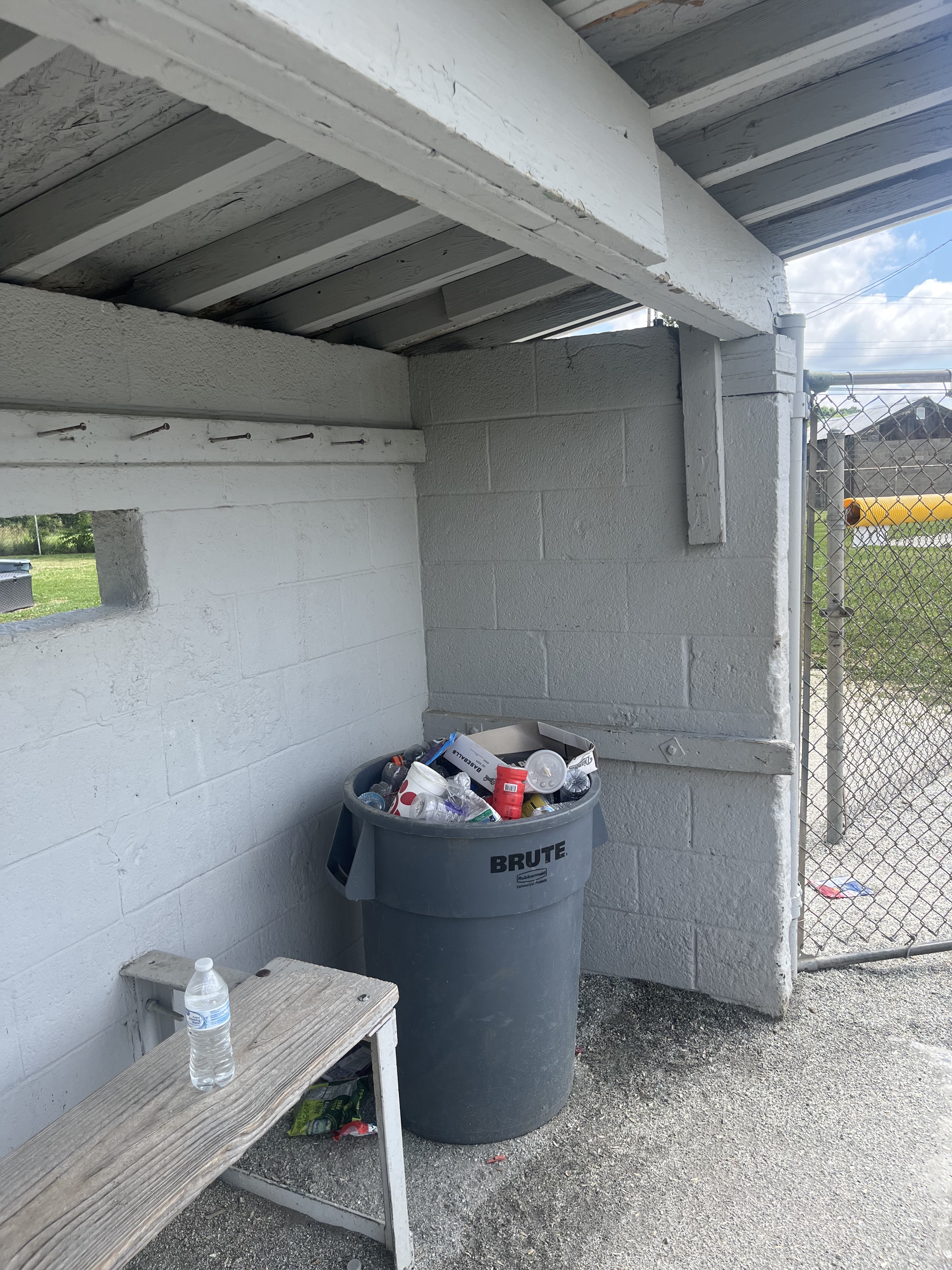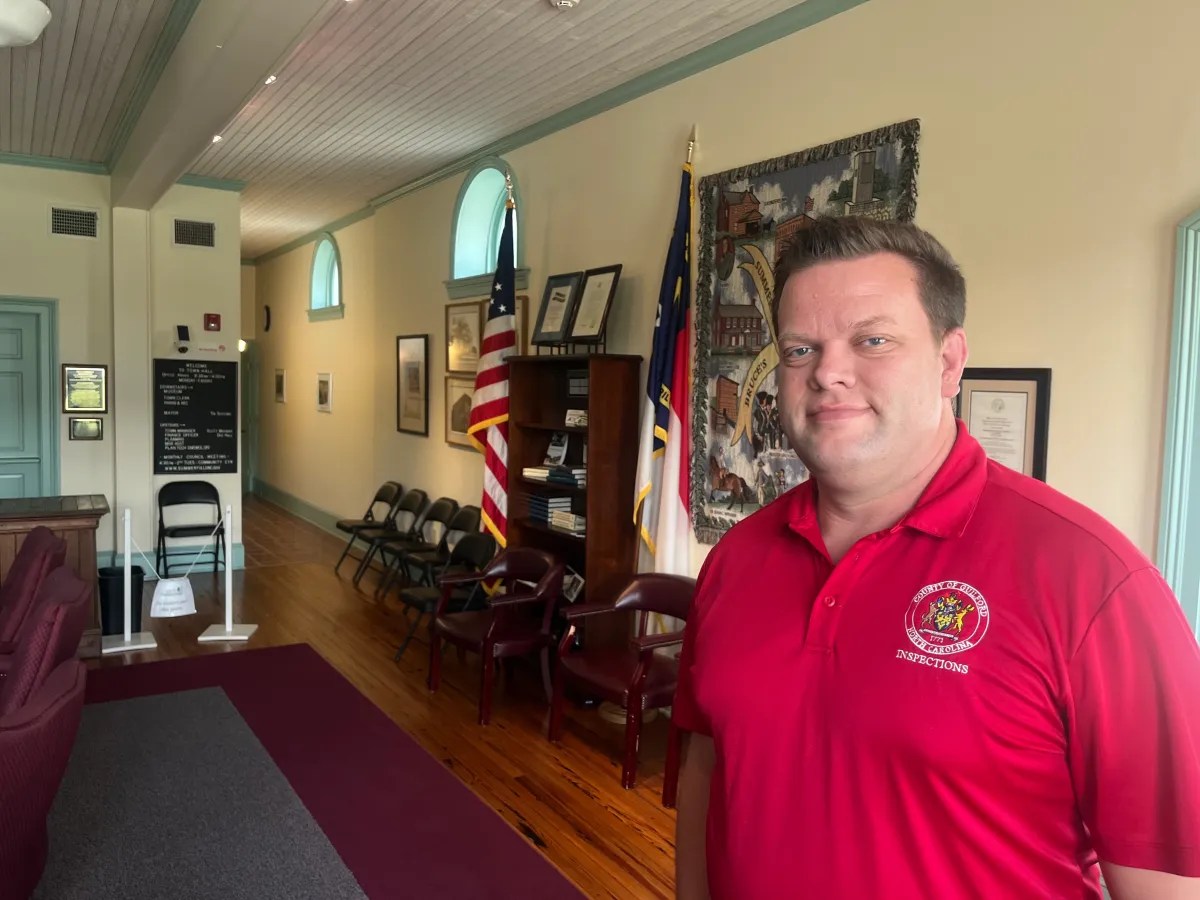|
Getting your Trinity Audio player ready...
|
Minutes before 9 a.m. on June 3, Summerfield Town Manager Scott Whitaker hung a sign on the front door of the two-story brick Town Hall that read, “There will be no Planning Services until further notice due to lack of staff. The town apologizes for the inconvenience.”
“I hate to do it,” Whitaker said before hanging the sign. “I am going to have to turn people away when once in their life they need our planning services.”
Earlier, Dee Hall, the town’s finance officer, removed the names of five employees from the staff letterboard. Gone is the town clerk, the director of parks and recreation, the planning director, the assistant to the town manager, and a planning technician.
By Monday, Whitaker and Hall will be gone too. This Guilford County community of 11,000 will have no town employees. They’ve all resigned.

The three part-time employees who maintain Summerfield’s baseball and soccer fields worked their last day on May 31. It shows. Shells of sunflower seeds, peanuts, and pistachios litter the ballpark and dugouts at the Summerfield Athletic Park. Garbage cans are at or near capacity. Bathroom stalls are littered with toilet paper, and the trash receptacle in the women’s handicapped stall needs to be emptied.
The resignation of all nine Summerfield employees (including the part-timers) is the most widespread in recent North Carolina municipal history. While other cities and towns have made news after entire departments resigned, such as the Kenly police in 2022, it’s rare for an entire government staff to resign.
Over group chats and when their boss was away from the office, the staffers discussed resignation for months leading up to the announcement.
The Assembly spoke to five of the nine employees; most asked for anonymity due to fear of harassment and retaliation from certain town council members. The employees, whose time of employment ranged from less than one year to over 11, described working for the town council as “demeaning,” “depressing,” “hostile,” and “uncomfortable.”
“You just can’t keep working for people who don’t respect you,” one employee said between tears.
“We made the decision to leave together because of how Scott [the town manager] was treated both in public and behind closed doors, and because of how we have been treated as staff,” Hall, the town’s finance director for eight years, said in a written statement.
Mayor Tim Sessoms told the Rhino Times that the community lost a wealth of experience with the resignations and that he tried to get several of the employees to return.

Council member Jonathan Hamilton, who was elected in November, wrote on Facebook that the mass resignations are “a great opportunity” for Summerfield: “This transition will allow [the new town] manager to carefully assemble a dedicated team committed to serving Summerfield while also forming a cohesive staff.”
Even before the resignations, Summerfield was ground zero in the fight to stabilize rising rents and home prices by developing more housing, as The Assembly reported last year.
The council has wanted to preserve its bucolic community of single-family homes, steadfastly resisting the construction of apartments and townhouses. That prompted some state legislators, including Senate Republican leader Phil Berger, to threaten to de-annex a chunk of the town so that it could be developed more densely.
To some, the great resignation is more than a smoke signal to the legislature; it’s an open announcement that the town is incapable of governing itself.
A Change in Leadership
The town elects five council members to four-year terms, as well as a mayor, who only votes in the case of a tie. The council is responsible for hiring a professional town manager, who oversees the staff and day-to-day operations of the town.
When two new council members came on board in December, it didn’t take long for dynamics to change.
On Valentine’s Day, around 1 a.m., the town council voted 4-1 not to extend Whitaker’s contract, stating that it was “one sided and unfair to the town as the employer.” The contract guaranteed the town manager a year’s severance pay if he was fired without a 60-day notice.
“About two months ago, we all started really exploring the opportunity of finding new places to work and it happened really fast,” one employee said. By the end of May, all nine employees had found new jobs.
On Sunday, May 19, eight town employees gathered for a photo wearing matching robin’s-egg blue staff T-shirts. Printed on the back was “Ohana means family,” a line from the 2002 animated film Lilo & Stitch.

Unbeknownst to the town’s residents, many of whom gathered that weekend for the annual Founder’s Days festival, it would be the staff’s last event. That weekend, employees left resignation letters on Whitaker’s desk and under his door.
Staff members told The Assembly about how they felt council members looked down on them and questioned their acumen, research, knowledge, and choice of vendors. They said they were micromanaged and demeaned by people who were not their day-to-day boss.
“It’s just that nothing is good enough, they always have to question the expert’s opinion, and it’s just not a conducive work environment,” an employee said.
Another employee said council member Janelle Robinson pushed to get passwords for servers—where Social Security numbers for staff dating back to 2000 are stored—and social media pages, despite experts from the UNC School of Government and North Carolina League of Municipalities advising that this information should not be shared under state law.
A third employee bemoaned that a council member questioned the fees schedule for the town’s athletic fields, shelters, and community center, seeking to change the rates that the parks director established.
“It’s just that nothing is good enough, they always have to question the expert’s opinion, and it’s just not a conducive work environment.”
former Summerfield employee
A fourth employee discussed how the finance officer’s work is routinely “put on trial” in public and in the office.
Robinson said the requests for passwords for town accounts were to ensure the transition to a new manager. “It’s not because we have any interest in seeing any personal information for ourselves and logging into anything,” she said, adding that the resignations were unfortunate.
In an email to the finance officer, Robinson wrote, “Dee, let’s be clear. I am not bullying you. No one is bullying you. I am simply asking for proof of what you claim. I see you cannot produce that though.” Less than an hour later, Robinson questioned a statute cited by a School of Government employee. “Have you even read that statute?” Robinson wrote in another email. “It has nothing to do with social media passwords. Which is exactly my point.”
The employees’ resignations followed and preceded other departures from the town.
In February, town attorney Bob Hornik resigned. In April, town lobbyist Sebastian King resigned, stating that his “efforts to provide counsel were not heeded.” In May, the town’s external auditor resigned, along with two long-term members of the town’s finance committee, Vicky Bridges and Alan Abrams.
“The recent actions regarding Scott’s employment contract along with other decisions, actions, and comments show an absence of care for staff and the future financial position of the Town,” Bridges wrote.
Abrams said: “Dee [the finance officer] has never had an audit finding, never had issues and has been publicly pilloried year after year accusing her of inaccuracies, accusing her of illegalities, and once these people got into power I didn’t want anything to do with them.”
Bigger Fight Ahead?
Summerfield, which borders Greensboro’s northwest side, is a largely white community of single-family homes on large lots. It was incorporated in 1996, becoming the first in a string of defensive incorporations in the region aimed at keeping Greensboro out. Soon after, the legislature chartered neighboring Oak Ridge and nearby Pleasant Garden as municipalities.
In North Carolina, municipal powers are given—or taken—by the state legislature. Some lawmakers have threatened to unincorporate nearly 1,000 acres from Summerfield’s boundaries to allow a more dense development than the town council will permit.

But an even bigger fight could be on the horizon. In the past month, some legislators have discussed revoking Summerfield’s charter. That would pave the way for Greensboro to annex the Summerfield area and extend water and sewer lines to residents, businesses, and the local fire district, which sends trucks to a reservoir at the town’s edge in an emergency.
“If it was me and I was going to pull their charter, there’d be no better point to pull it right now when there were no staff,” a longtime Summerfield employee said.
Berger dismissed the idea in May but mentioned that the legislature could require some municipalities to provide more services, jabbing at Summerfield’s “limited services government” nature. The town provides only planning and parks services—no utilities, public works, emergency, economic development, or social services.
“The recent actions regarding Scott’s employment contract along with other decisions, actions, and comments show an absence of care for staff and the future financial position of the Town.”
Vicky Bridges, chair of the finance committee
Requiring additional services would be difficult, said Scott Mooneyham, director of political communication at the North Carolina League of Municipalities.
Municipalities have different histories and different needs, he said. Some started more than a hundred years ago as mill towns and others are bedroom communities that incorporated in recent decades primarily to avoid being annexed by larger cities.
The few services Summerfield provides have stalled. Town staff have canceled the annual fishing derby and the summertime music in the park. The ball fields, which are booked for about 30 tournaments through July, will no longer be maintained by the town.
Some on the town council have committed to not missing a beat. Hamilton said he has volunteers lined up to help. On June 3, Robinson came to Town Hall to ensure that it would be open through the week and to keep the gates to parks facilities open. “I’ll go clean bathrooms and empty trashes,” she said.
The next day she and two other residents cleaned the town’s restrooms and picked up trash at the athletic fields. The local recreation association dragged the dirt baseball infields to keep them smooth.
Departing staff members say volunteers are not trained to fill their responsibilities, including checking for loose bolts on playground equipment, ensuring fields are properly maintained to avoid injuries, coordinating the town’s contractors, reviewing and approving planning documents, and maintaining the town’s equipment and lights.

At 3:15 p.m. Monday, Matthew Crawford, director of building inspections with Guilford County, walked through the doors of Summerfield’s Town Hall, wondering who remained. After learning that the town’s planners are gone, he said building would come to a halt.
Lindsey Stewart, a builder with LJ Custom Homes, was one of several people seeking help Monday in Town Hall. She had heard that staff resigned, but figured there had to be a way to get the permits she needs to build a new home on Belford Road.
“I felt someone had to be there to do something,” said Stewart. Her client, a Summerfield property owner, was ready to build her dream home. “If your client is ready to start now, and you can’t apply for permits, you can’t channel it through. It’s holding the homeowner up.”
Ren Larson is a staff reporter at The Assembly. She previously worked for The Texas Tribune and ProPublica’s investigative team, and as a data reporter with The Arizona Republic. She holds a master’s of public policy and an M.A. in international and area studies from the University of California, Berkeley.


